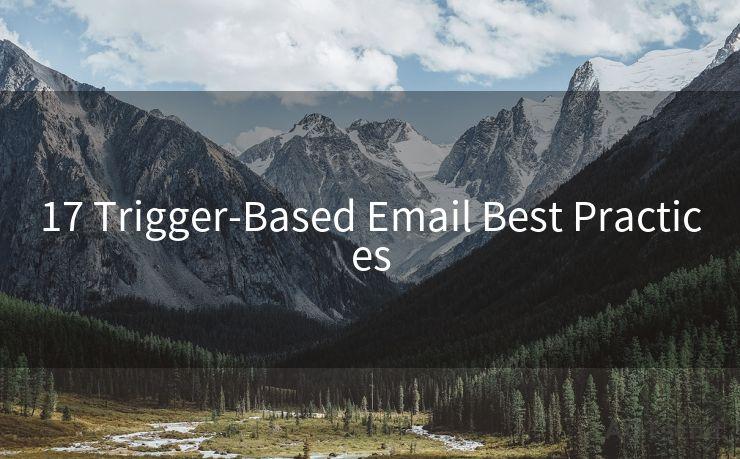17 Trigger-Based Email Best Practices




In the world of digital marketing, trigger-based emails have become an essential tool for enhancing customer engagement. These emails are automatically sent based on specific user actions or predefined events, making them highly relevant and timely. Here are 17 best practices for creating effective trigger-based emails that will help you boost customer engagement and loyalty.
1. Define Clear Triggers
Identify the specific user actions or events that will trigger an email. These could include signing up, abandoning a cart, or browsing a particular product category. Clear triggers ensure that your emails are relevant to the user's behavior.
2. Personalize Content
Use the data you have about your customers to personalize the email content. Address them by name, recommend products based on their past purchases, and tailor the messaging to their preferences.
3. Keep It Simple
Avoid clutter and confusion in your email design. Stick to a clean, minimal layout that focuses on the core message and call to action.
4. Optimize for Mobile
Most emails are now opened on mobile devices. Ensure your emails are mobile-friendly with responsive design and easy-to-click buttons.
5. Test Subject Lines
The subject line is crucial in determining whether an email will be opened or not. Test different subject lines to see which ones resonate best with your audience.
6. Time Your Emails
Timing is everything. Consider the best time of day and day of the week to send your emails based on your customers' behavior patterns.
7. Use Clear Call-to-Actions
Your emails should have a clear and compelling call-to-action (CTA) that guides the reader to the next step, whether it's making a purchase, signing up for a service, or downloading an app.
8. Measure and Optimize
Track the performance of your emails using analytics tools. Monitor open rates, click-through rates, and conversions to understand what works and what doesn't.
9. Avoid Spam Filters
Familiarize yourself with common spam trigger words and avoid using them in your emails. Also, ensure your email sending practices comply with anti-spam regulations.
10. Segment Your Audience
Divide your audience into segments based on their interests, demographics, or purchase history. This allows for more targeted and relevant emails.
11. Use Engaging Content
Include engaging content like videos, images, or interactive elements to capture your audience's attention.
12. A/B Testing
Conduct A/B tests to compare different versions of your emails and see which ones perform better.

13. Follow Up
Don't be afraid to send follow-up emails if the initial one doesn't get a response. Sometimes, a gentle reminder can make all the difference.
14. Respect Unsubscribes
Always include an unsubscribe option in your emails and respect users' choices if they decide to opt-out.
15. Maintain Consistency
Ensure your emails align with your brand's voice, tone, and style to maintain consistency across all marketing channels.
16. Provide Value
Every email you send should provide some value to the reader, whether it's an exclusive offer, useful information, or a solution to a common problem.
17. Continuously Learn and Adapt
Marketing is an evolving field, and it's essential to stay up-to-date with the latest trends and best practices. Continuously learn from your campaigns and adapt your strategies accordingly.
By following these 17 best practices for trigger-based emails, you can significantly boost customer engagement and loyalty, driving more conversions and sales for your business. Remember, always test, measure, and optimize your campaigns for maximum effectiveness.




🔔🔔🔔
【AOTsend Email API】:AOTsend is a Managed Email Service for sending transactional emails. Support Email Types: reminders, authentication, confirmations, notifications, verification codes, invoices, password resets, account activations, billing statements, two-factor authentication (2FA), and one-time passwords (OTP) emails, etc. $0.28 per 1000 Emails. 99% Delivery, 98% Inbox Rate.
You might be interested in:
Why did we start the AOTsend project, Brand Story?
What is a Managed Email API, How it Works?
Best 25+ Email Marketing Platforms (Authority,Keywords&Traffic Comparison)
Best 24+ Email Marketing Service (Price, Pros&Cons Comparison)
Email APIs vs SMTP: How they Works, Any Difference?
Scan the QR code to access on your mobile device.
Copyright notice: This article is published by AotSend. Reproduction requires attribution.
Article Link:https://www.mailwot.com/p7144.html



